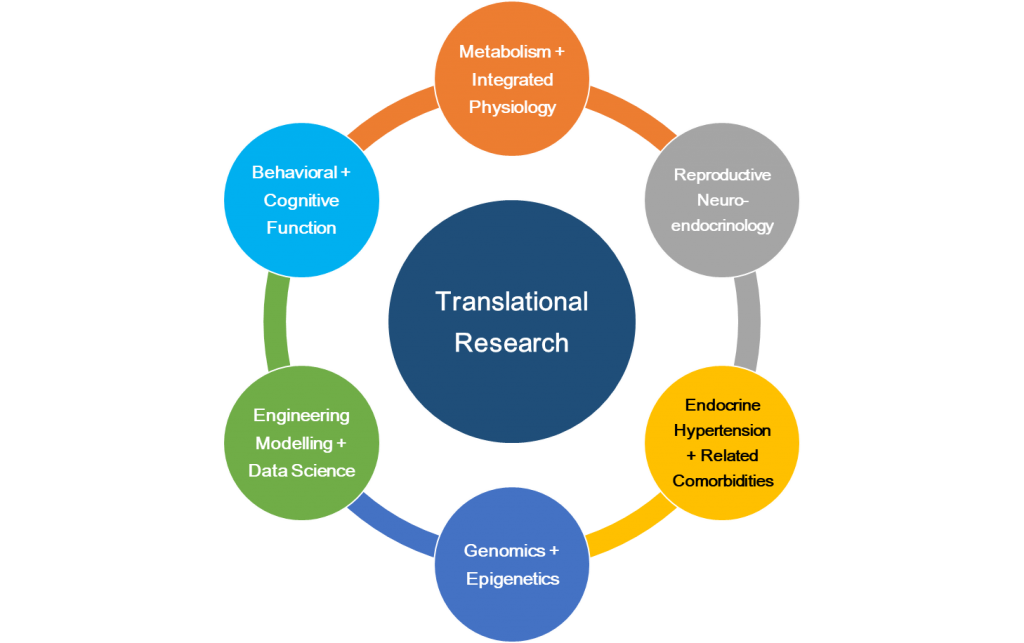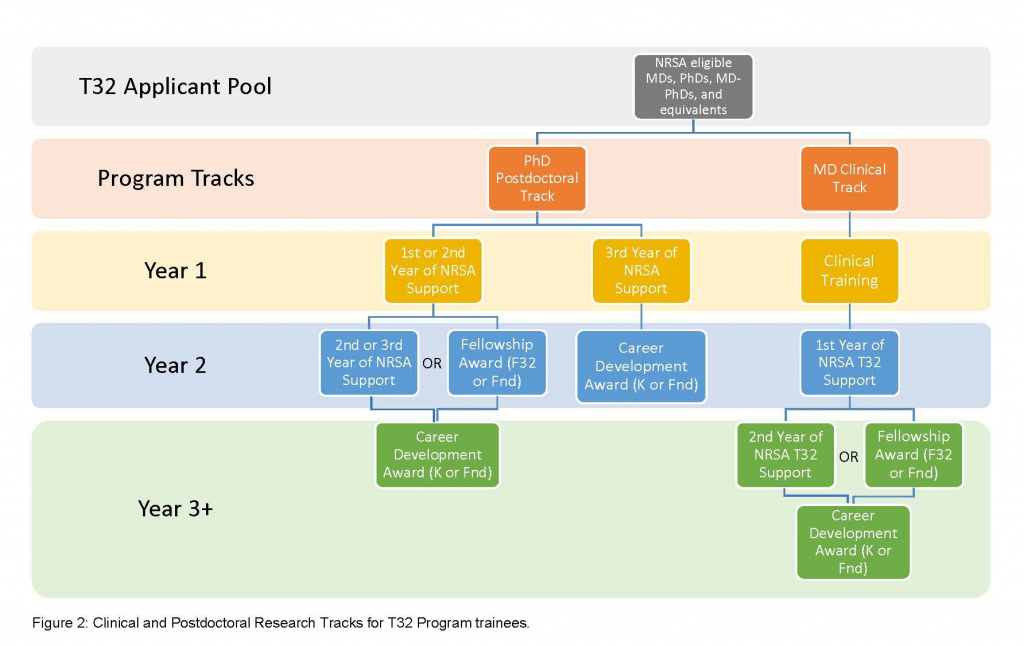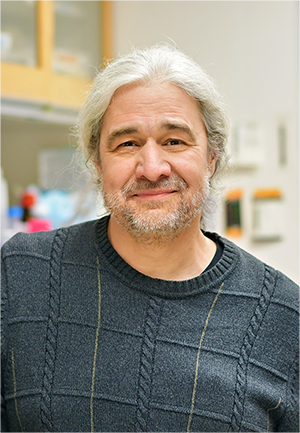Basic Science and Clinical Research
Information Related to Endocrine Research
Clinical Research Information for Professionals
- The School of Medicine Office for Research supports and promotes basic, clinical, and translational investigation in the School of Medicine and facilitates research cooperation and interaction across the institution.
- Department of Medicine research-related webpages
- NIH webpages related to the NIH Grant Application Process
Clinical Trials Information for Patients
Clinical trials are scientific study that tests the effectiveness of a treatment, a device, or a drug. A trial could test, for example, the effectiveness of blood pressure medication in lowering blood pressure or whether a certain drug could decrease cholesterol.
If you are interested in participating in one of our clinical trials, you can review the currently active UVA trials webpage under the “Endocrinology” section.
Research Training Programs

“Research Training in Neuroendocrinology & Metabolism” is an NIH-funded T32 Training Program focused on providing high-quality research training to postdoctoral trainees interested in pursuing careers in translational research. The NIDDK-funded grant T32 DK007646 supports the program and provides trainees with research training support for 1 to 3 years. We welcome applicants with PhDs, MDs (or equivalent), and combination MD/PhDs to join as postdoctoral trainees. The ultimate goal of our program is to provide exceptional support in both technical and professional research skills so that upon completion of the program, trainees are equipped with the tools and knowledge necessary to apply for and manage independent research funding successfully.
ABOUT THE PROGRAM
The training program began in 1990 under the leadership of Dr. Robert MacLeod and, throughout its 32 years of funding, has been led by a distinguished group of investigators with a broad knowledge of neuroendocrine and, more recently, metabolic and cardiovascular diseases. Though closely affiliated with the Division of Endocrinology & Metabolism, the training program engages with various University resources and institutionally sponsored symposia to encourage collaboration and enhance the training experience for successful trainee outcomes.
MEET OUR PROGRAM DIRECTORS

Dr. Zhenqi Liu MD, T32 Associate Director, has served as Chief of the Division of Endocrinology and Metabolism for over ten years and has extensive experience as a clinician, investigator, educator, and administrator. Throughout his career at the University of Virginia, he has trained and mentored many medical students, residents, endocrinology fellows, PhD students, and postdoctoral research fellows.
Dr. Thurl Harris, PhD, T32 Associate Director, brings the perspective of a primary science investigator to our T32 leadership team. Beyond being an accomplished investigator, he has trained dozens of undergraduate, graduate, and postdoctoral fellows. For the past five years, he has served as Director of Graduate Studies for the Department of Pharmacology.
PROGRAM TRACKS
Trainees can choose from one of two main research training tracks depending on their degree and prior experience.
Clinical – Many of our MD applicants are already associated with the Division of Endocrinology and Metabolism’s Clinical Fellowship Program. Eligible clinical fellows interested in pursuing research training as a part of their clinical fellowship are welcome to apply for support from the T32 program. The typical MD Clinical Track begins with an initial year of pure clinical fellowship training and two or more years of integrated research training funded by the T32.
Basic Science – Applicants with PhDs can join our program directly after receiving their postdoctoral degrees or postdoctoral training if they have received no more than two years of postdoctoral training support from another NRSA T32 training program or F32 fellowship. Individual training plans and goals will vary depending on each trainee’s experience level upon entering the program.
Trainees must develop vital research projects on both tracks with their mentors. They will apply for extramural funding (NIH F32 or foundation fellowship funding) for their second or third years of training support. Trainees with more advanced experience and in their third year of NRSA T32 support are encouraged to prepare applications for Career Development Awards (either NIH K award or foundation Career Development Award). The eventual goal is for young researchers to transition successfully from training and fellowship to Career Development Awards and then to independent research funding (NIH R01 or equivalent).

MENTORS
The program draws upon the dedication and expertise of 25 mentors from the School of Medicine and beyond. Our mentoring team comprises a variety of clinician-scientists and basic science investigators committed to cultivating the next generation of researchers in neuroendocrine and metabolic diseases. Many of our mentors’ research interests intersect, resulting in a rich collaborative research environment for trainees to take full advantage of. We encourage mentorship with experienced senior mentors and joint mentorship of trainees from senior and junior faculty teams as individual training objectives may require.
FIND A MENTOR
Don’t know where to start? Browse by thematic areas of interest below.
LEARN MORE
For more information or questions about the Research Training in Neuroendocrinology & Metabolism T32 Training Program, please contact:
Zhenqi Liu, MD
Associate Director
Division of Endocrinology & Metabolism
University of Virginia School of Medicine
Email: ZL3E@uvahealth.org
Find us on UVA’s iTHRIV portal to keep up with upcoming events and symposia.
The Endocrinology Fellowship Program partners with the Medicine Residency Program to offer an ABIM Research Pathway. This pathway may be desirable for applicants to the Medicine Residency Program who (a) have substantial research experience as evidenced, for example, by a Ph.D. or Master’s degree, research publications, etc., and (b) aspire to a career as a physician-scientist.
The Medicine-Endocrinology pathway consists of two years of internal medicine training in the categorical track, one year of clinical training in the endocrinology fellowship program, and three years of mentored research training under the auspices of the Division of Endocrinology. (A weekly endocrinology continuity clinic experience is required during the research years.) While this pathway does not allow early completion of training (i.e., this pathway still involves six years of training), it enables compression of clinical training to expand dedicated research training. This can be advantageous to candidates desiring a long-term physician-scientist career.
Medical students interested in this option at the University of Virginia should direct initial inquiries to the Medicine Residency Program (see UVA Department of Medicine ABIM Research Pathway webpage).
For additional information about the ABIM Research Pathway, please visit the ABIM website (http://www.abim.org/certification/policies/research-pathway/policies-requirements.aspx).
For specific questions regarding how the Division of Endocrinology and Metabolism partners with the Department of Medicine to implement the ABIM Research Pathway, contact the Endocrinology and Metabolism Fellowship Program Director.
Endocrine-Related Research Centers/Units
 Center for Research in Reproduction: The Center for Research in Reproduction Ligand Assay and Analysis Core provides high-quality, cost-effective assay services for CRR projects and other Reproductive Sciences
Center for Research in Reproduction: The Center for Research in Reproduction Ligand Assay and Analysis Core provides high-quality, cost-effective assay services for CRR projects and other Reproductive Sciences
Clinical Research Unit: The Clinical Research Unit (CRU) of the School of Medicine Clinical Trials Office provides a location and skilled staff for investigators conducting inpatient and outpatient clinical and translational research at the University of Virginia.
Center for Diabetes Technology: The Center for Diabetes Technology (CDT) works to advance technology — including advanced analytics and closed-loop insulin delivery systems — in the care of patients with diabetes.
Virginia Center for Diabetes Prevention & Education: The mission of VCDPE is to improve the quality and accessibility of care for persons in Virginia with diabetes by providing educational programs and resources for diabetes educators based on current research and best practices.

